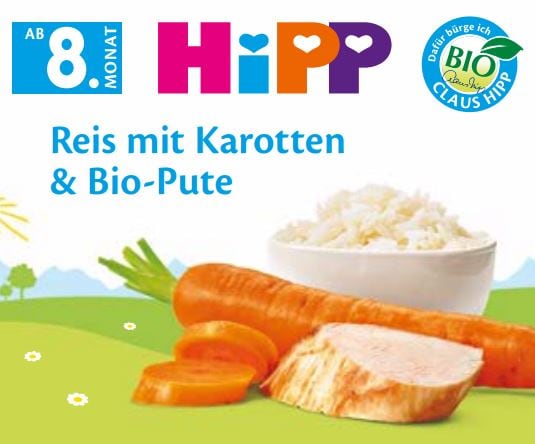Earlier this month the Croatian Food Agency (HAH) sent samples taken from the Croatian and German supermarket shelves to accredited laboratories to be tested, finding differences in either the ingredient composition or price in almost 85% of the products, including HiPP’s ‘Rice with carrots and turkey’.
HiPP's Croatian product contains fewer vegetables and less rapeseed oil, meaning it has lower levels of healthy omega-3 fatty acids. The Croatian product is also 50% more expensive.
Equal but different?

Despite rejecting suggestions that the reformulation is an admission of the Croatian product's inferior quality, the firm will reformulate and relaunch it “with an adapted recipe which is equal to the German one” within the next few months.
“From our point of view the German and the Croatian recipes can be seen as equal in their composition. The product definitely doesn’t have an ‘inferior’ quality,” said sales and marketing manager at HiPP Croatia Ninoslav Šajatović.
“Due to the current public discussion about different recipes in European countries we learnt that even slightest differences in our international recipes could lead to misinterpretations, which we regret very much.”
"We hope that the consumer will perceive our decision as a sign of our respect for his expectations and wishes," added Šajatović.
HiPP said the current Croatian recipe was also used in Germany for many years but, following some consumer demands regarding its consistency, was adapted in 2010. The manufacturer added “a small amount of potatoes”.
“In Croatia the original recipe without potatoes was very popular because of its particularly simple composition, which is why it was not changed at that time.”
The company will inform the consumers about the recipe change on the label.
The German recipe contains 30% carrots, 8% potatoes, 15% boiled rice 8% turkey meat and 1.9% rapeseed oil, while the Croatian recipe has 24% carrots, 21% rice, 8% turkey meat and 1.7% rapeseed oil.
More recipe relaunches to follow
Šajatović says it developed numerous different recipes in the past because of varying regional customer preferences in its international markets.
“HiPP is assessing these numerous country-specific recipes in terms of potential equalisations or keeping country-specific versions where this deems necessary,” he said.
“As a result, the major part of our recipes for menus could be equalised, the few remaining recipes will follow suit the next months.”
MEP: ‘We cannot rely on goodwill to end this discrimination’
Croatian MEP Biljana Borzan, a member of the Socialist and Democrat party, told FoodNavigator she saw HiPP’s decision to reformulate as a victory for consumers.
“I welcome this action and would like other producers to follow the example.”
However, regulation at an EU level was still needed to stamp out the practice, she said.
“We cannot function on the principle of name and shame. This study [conducted by the Croatian Food Agency] was extremely demanding and expensive and we had only 26 products. We cannot rely on studies and producers’ goodwill to end this discrimination.”
'One union, one quality'
A spokesperson for the Croatian Food Agency said: "We are very happy that HiPP is being proactive and will [...] thus regain the trust of European consumers from 'new' member states who indeed feel they are second grade citizens. We are also delighted that this issue became an important issue in EU, since equality is one of EU basic values.
"Our agenda is: 'One union - One quality'. Our intention is to investigate this question and, if there is a need, to influence the industry to change the dual standard practice, and finally that this becomes a legal obligation."
The spokesperson also praised Nestlé for being "one of the bright examples".
"They contacted us immediately [after the survey] and informed us that they will change and harmonise the allergen labeling on Nesquik on Croatian market. [This] wasn't an example of dual quality but it is an example of good reaction and collaboration."
